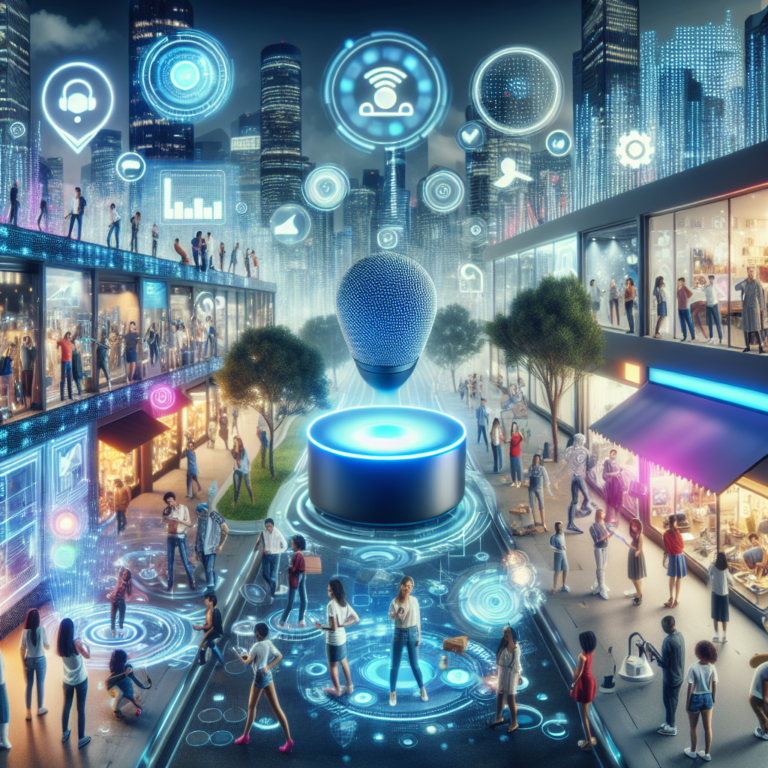Discovering the Whisperverse: The Impact of AI Voice Agents on Daily Life
As technology continues to evolve, a notable critique of major tech companies has been their tendency to treat users as mere data points or “glassy eyeballs” for targeted advertisements. However, this dynamic is shifting rapidly. Our sense of hearing is set to become a thrilling new medium for interaction with AI voice agents, guiding us through our daily activities. Welcome to the Whisperverse.
Imagine a world where an AI-powered voice seamlessly integrates into your life, providing gentle reminders and assistance at every turn. Picture this: while you stroll down the street, your AI could softly prompt you to pick up your dry cleaning or help you locate your car in a crowded parking lot. Consider AI assisting you in conversations, offering clever comments to enhance your charm and intelligence. This remarkable technology can truly feel like a set of superpowers at your fingertips!
The Technology Fueling the Whisperverse
Yet, you won’t be the only individual enjoying these enhancements. Many people will likely have simultaneous access to similar capabilities, creating a competitive landscape where adopting AI guidance becomes essential to avoid falling behind. This transition is redefining mobile computing, leading us toward wearable devices that will understand our environment and deliver critical insights in real-time.
- AI-powered glasses: These cutting-edge devices will predominantly take the form of glasses, as their design allows for the best perspective to capture our surroundings with cameras.
- Camera-enabled earbuds: Although less common, these devices will also be available, presenting alternative methods to access AI guidance.
- Visual content display: Glasses can exhibit visual content, offering silent support through text and images right within our reality.
As sensors capture data about our surroundings, we will be able to interact with our AI companions using simple gestures, like a head nod. This level of engagement will feel instinctive, resembling our interactions with other individuals.
The integration of AI and augmented reality (AR) is directing us toward a future where AI assistants can observe and advise us as we navigate our daily lives. Their assistance will become so invaluable that we may feel dependent on it. However, this advancement also raises important privacy concerns and fears regarding AI-driven manipulation. When large tech companies promote these “superpowers,” eschewing these tools could put individuals at a disadvantage in various aspects of life, be it social, professional, or economic.
The Transformation of Daily Life Through Augmented Mentality
Having dedicated over 30 years to researching this field—from my roots in prestigious institutions to my roles as a professor and entrepreneur—I have witnessed remarkable advancements in how technology interacts with human capability. The term “augmented reality” didn’t even exist during my early studies; I simply referred to it as perceptual overlays. My work has shown how AR can significantly elevate human abilities.
Today, we require new terms to describe the emerging AI-driven agents organizing our daily tasks. I frequently label this growing field as augmented mentality because it will profoundly modify how we think, feel, and act.
Regardless of the terminology used, it is evident that this transformation is on the horizon. AI will support us in various scenarios: at work, during educational pursuits, and even while we indulge in late-night snacks at home. For those doubtful of this trend, consider the significant investments and rapid advancements made by tech giants like Meta, Apple, Google, and Samsung. By the year 2027, the mobile device market is projected to become a battleground for these innovations.
The Initial Steps into AI’s Future
Meta has already embarked on this journey with the introduction of AI-powered Ray-Ban glasses. While they currently target a niche market, these glasses mark an important step forward in mobile technology by providing context-aware assistance. Equipped with microphones and cameras, they connect to a powerful AI engine that offers verbal support right in your ear. Features like locating your parked car or real-time language translation were recently highlighted during Meta Connect, showcasing their impressive capabilities.
Imagining a Playful Future with AI Voice Agents
Although the Ray-Ban design is merely the beginning, the next generation of devices aims to enhance visual experiences. In September, Meta revealed its prototype Orion glasses, expected to deliver high-quality images in a wearables format. While these are not set for immediate commercial launch, they lay the groundwork for future consumer-friendly models.
So, what does the future have in store? By the early 2030s, a fusion of AI and AR will allow assistants to present themselves in photorealistic forms, engaging us within our line of sight. These won’t be large humanoid figures hovering beside us—such a scenario could feel quite eerie. Instead, I envision them as charming small creatures that flit about, imparting guidance and information throughout our daily routines.
In my 2020 short story “Carbon Dating,” I described these delightful AI helpers as Electronic Life Facilitators (ELFs). This term encapsulates the essence of their roles in our lives—small, whimsical companions that provide timely information, assisting us in navigating work meetings or helping us find items while grocery shopping. These interactions promise not only practicality but also an enchanting quality to our daily lives.
Understanding the Challenges of AI-Assisted Living
However, introducing intelligent systems that whisper insights in our ears carries considerable risks. These tools risk becoming instruments for targeted influence. When combined with technology that can alter our environments, this raises concerns about compelling persuasion and manipulation that are unprecedented.
To alleviate these dangers, industry leaders must avoid adopting a profit-driven model dominated by advertising when launching these AI voice agents. They must also be aware of how these technologies may shape social dynamics and personal interactions. Cautionary films like “Privacy Lost” highlight critical considerations regarding their societal implications.
For thirty years, I have promoted using AR and AI to boost positive human capabilities. However, I caution against allowing corporations to compete over how effectively their AI can manipulate consumer preferences. To realize this extraordinary potential while safeguarding our privacy and autonomy, prompt regulatory measures are essential to clarify guidelines for this emerging field.




0 Comments